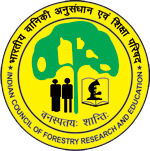Introduction:
The Institute of Forest Biodiversity was established during December 2012 vide ICFRE order no.58-21/XLVII/2012-ICFRE, dated 7th December 2012, by way of upgradation of the erstwhile Forest Research Centre, Hyderabad.
The Institute is located at Dulapally, which is 23 Km away from Secunderabad Railway station and 65 Km away from Rajiv Gandhi International Airport, Shamsabad. Spread over an area of one hundred acres, the Institute has the necessary infrastructure viz., administrative block, three laboratories (molecular genetics, tissue culture and soil science), library, field trial areas (comprising germplasm banks, seedling seed orchards, and agroforestry models), nursery area (complete with shade houses and mist chamber) to take up research and development projects on the biodiversity. The Institute has a field station spread over sixty acres at Mulugu, Hyderabad.
Mandate:
1. To undertake and promote forestry research, education and extension, leading to scientific and sustainable management of biodiversity, including marine and coastal resources.
2. To provide scientific advice to the central and state governments aiding informed decision making in matters of national and regional importance and international commitments and to address forestry research needs.
3. To provide technical assistance and material support to states, forest dependent communities, forest based industries, tree & NTFP growers and other stakeholders in forestry based programmes for conservation and sustainable use of forest resources.
4. To undertake research on biodiversity assessment, documentation, conservation and sustainable utilization, particularly of marine and coastal biodiversity resources.
5. To undertake research and knowledge management on various aspects of forests, viz., forest soils, invasive species, forest fires, insect pests and diseases.
6. To develop, upscale, disseminate and share appropriate technologies to end-users through innovative extension strategies and capacity building programmes.
7. Quantitative ecological assessment, In situ and Ex situ conservation of RET / endemic species and documentation of biodiversity of Eastern Ghats.
8. Genetic resource assessment of endemic and rare plants of Eastern Ghats for conservation planning.
9. Sustainable utilization of Eastern Ghats biodiversity including marine and coastal biodiversity resources.
10. Climate change studies related to Eastern Ghats, mangroves and coastal ecosystems.
11. Environmental impact assessment of developmental activities on biodiversity and eco-rehabilitation of stress sites.
12. To undertake all such activities as necessary, incidental and conducive to attainment of the objectives of the Council.
Core Research Areas:
1- Quantitative ecological assessment and documentation of biodiversity of Eastern Ghats.
2- Genetic resource assessment of endemic and rare plants of Eastern Ghats for conservation planning.
3- Threat assessment for classification of Eastern Ghats biodiversity into rare, endangered and threatened species.
4- In situ conservation of the RET and endemic species of Eastern Ghats by identifying conservation populations/stands within the protected area networks.
5- Ex situ conservation of the RET and endemic species of Eastern Ghats by establishing germplasm banks, seed storage rooms and tissue culture rooms.
6- Utilization of Eastern Ghats biodiversity by applying the principles of genetic improvement and clonal propagation.
7- Utilization of Eastern Ghats biodiversity by the society by applying the principles of agro forestry.
8- Protection of Eastern Ghats biodiversity from the endemic and introduced insects and pathogens.
9- Effects of climate change on the biodiversity of Eastern Ghats and their mitigation.
10- EIA of mining and other mega projects on the Biodiversity of Eastern Ghats and their eco- rehabilitation.
Geographical Jurisdiction:
1- Eastern Ghats for Forest Biodiversity
2- Andhra Pradesh and Telangana
3- Forest Biodiversity aspects of Maharashtra and Goa
Key Achievements: (Click on link to view detail)
2- Forest Genetic Resource Assessment & Conservation:
4- Integrated Pest Management:
For more information visit: http://ifb.icfre.gov.in/




